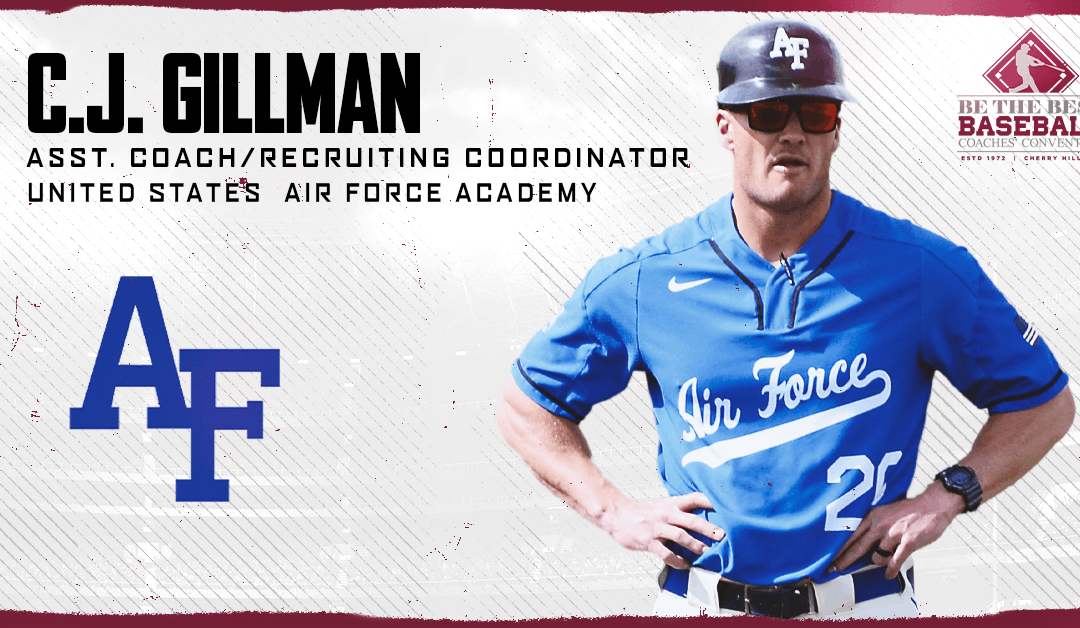
Oct 15, 2019 | Baseball, Be The Best News, Coach Profiles
C.J. Gillman
Assistant Coach/Recruiting Coordinator
United States Air Force Academy
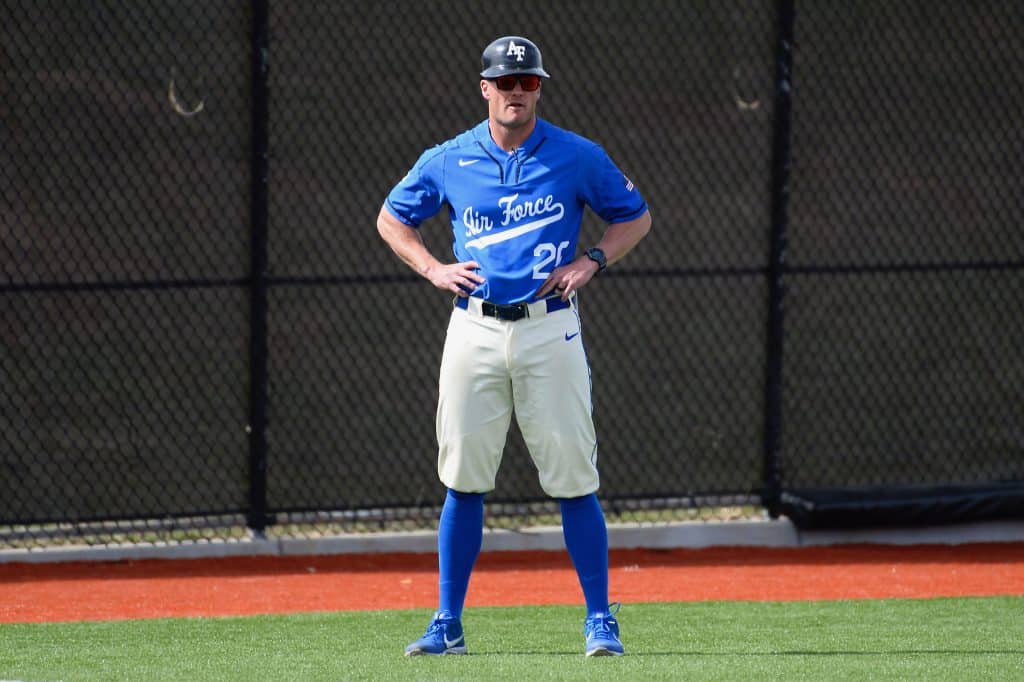
The guy C.J. Gillman most respects is his boss, Mike Kazlausky. The dude who’s been the biggest influence in life is his dad. And the best part of his journey has been getting to coach his little brother, Tommy.
Sometimes, the important people in our lives motivate us. Sometimes, they mentor us. Sometimes they change us. And, sometimes they do all three.
If we take even the quickest of looks at these MVPs, we get a pretty good idea of who C.J. has become as a coach and a man.
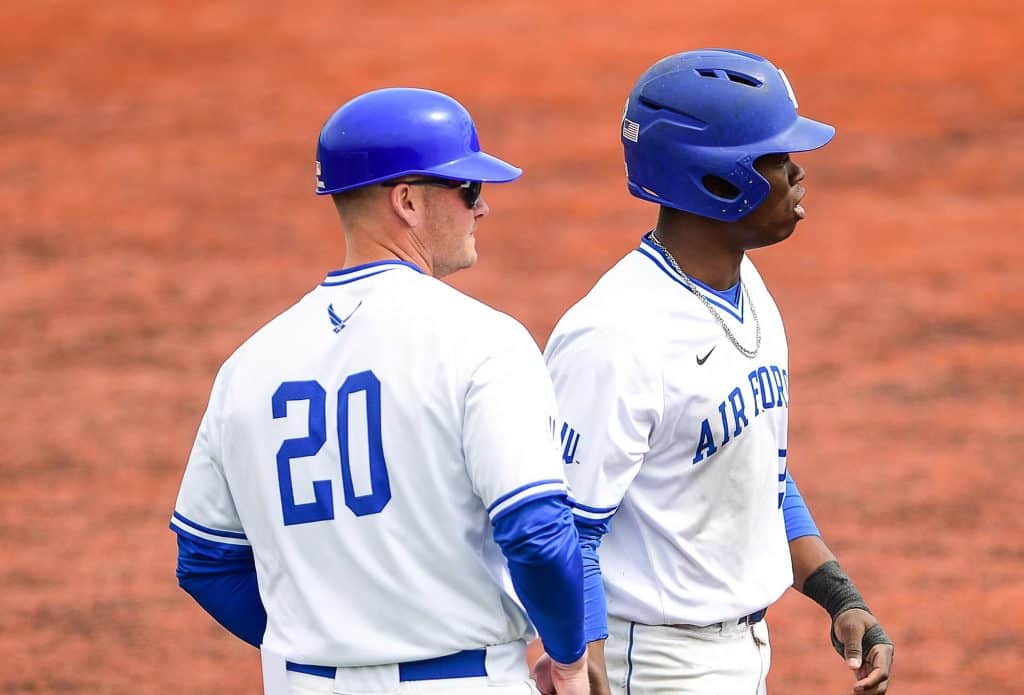
Mike Kazlausky, who was a walk-on to the Air Force Falcons’ baseball team back in 1988, ended up as a four-year starter who graduated with eight career records. With a couple of assistant coaching stints back at his alma mater between active service and deployments, he became full-time head coach of the Air Force Falcons baseball team in 2012. That’s following 20 years of service to our country.
Chuck Gillman, who served 40 years on the diamond, is a long-time Colorado high school baseball coach. He coached both of his sons at Columbine High School, winning the 5A title in 2006 when C.J. was a junior. When his younger son, Tommy, graduated in 2016, he retired as head coach to free himself up to watch Tommy play in college.
Tommy Gillman, with stints at Texas A&M and Midland College under his glove, decided it was time to fly higher. After he was accepted at the Air Force Academy, he found he had to start over academically and though a junior on the field was only a freshman in the classroom. But, all that basic training and hard work has been worth it, because he’s getting coached by his big brother.
And, of course, Papa Gillman couldn’t be happier. With his two sons together right up the road, he can continue to be a daily presence in the lives of the kids he coached from the time they could first hold a bat.
C.J. graduated from the University of Dayton in 2012 with a degree in Leadership. He lead the Flyers to their first conference tournament championship and NCAA Regional appearance in school history He is the season record holder in hits (91) and ranks among the top five for single season RBI, doubles and stolen bases.
After college, C.J. played two years of professional ball with stints in the Colorado Rockies minor league system and the Windy City Thunderbolts of the Frontier League before returning to Dayton to help coach for a year.
From there, he headed to the United States Air Force Academy where he is entering his sixth year as Assistant Baseball Coach. C.J. works with the catchers, base running, and running the offense as well as heading up the recruiting efforts.
C.J. Gillman’s coaching philosophy is Do Damage.
Head Coach Mike Kazlausky’s motto is Take Care of Your People.
And, that just about sums it all up.
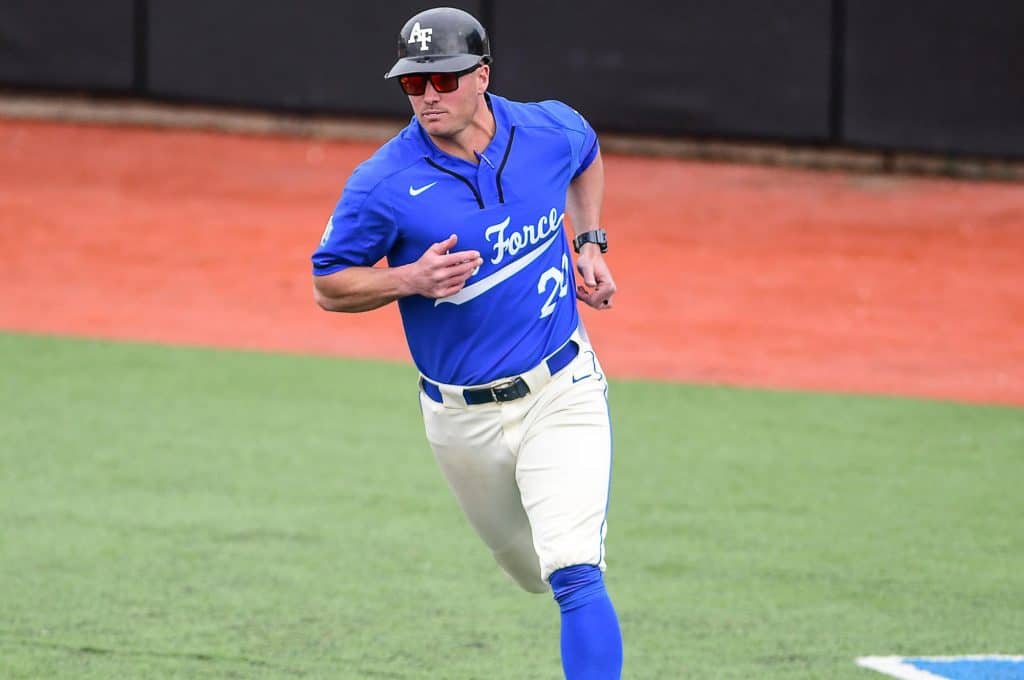
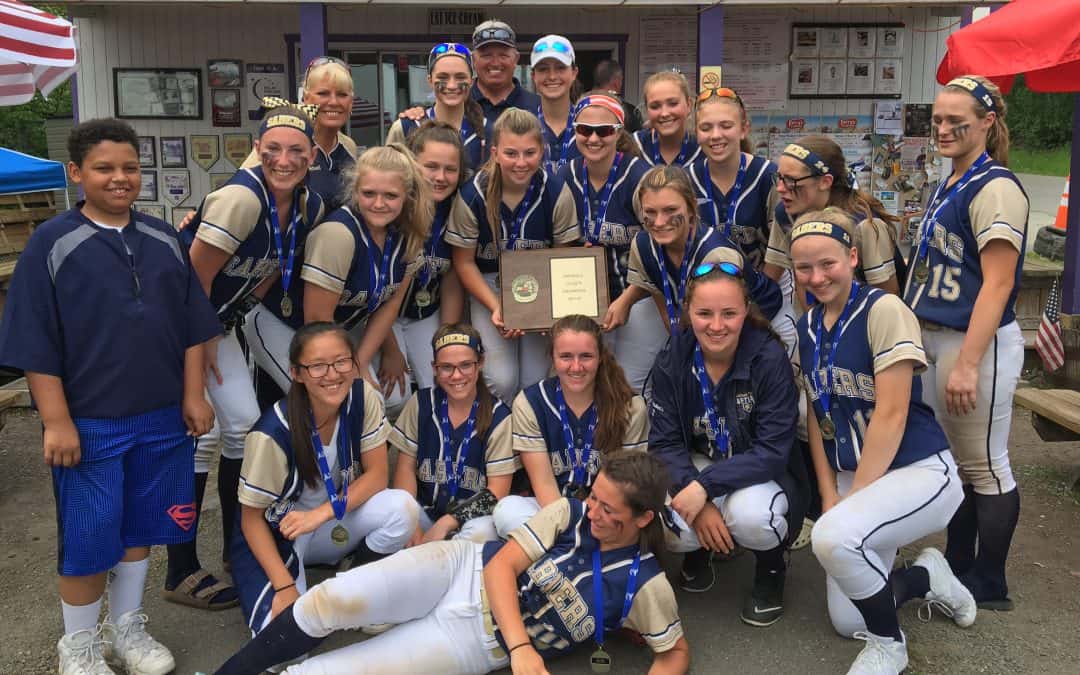
Jan 20, 2019 | Coach Profiles, Softball
Karen Bidwell
Head Softball Coach,
Susquehanna Valley High School
Conklin, NY
16U and 18U Club Coach
25 years of coaching
What’s the best thing about being a coach?
The best thing about coaching for me is being able to coach with my husband! Since 1999, I have been so lucky to have had an amazing coach by my side, throughout it all! My husband, Ken, and I are co-head coaches on the club teams, and although I am technically the head coach of our high school team, Ken is way more than an assistant. He is an invaluable asset and as much a coach as I am. My successes are certainly his as well.
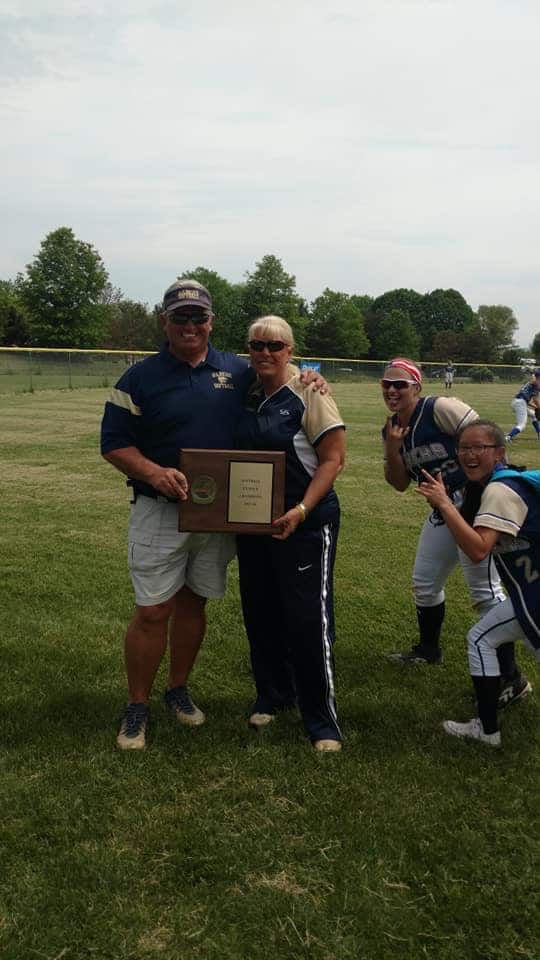
Who is your biggest motivator or influence?
My husband, Ken, has actually been my biggest motivator. He is a fantastic coach who relates to his players. He is knowledgeable, fair, caring, dedicated, and puts his heart and soul into coaching. He is everything I believe a coach should be.
Ralph and Karen Weekly hold a special place in my softball heart. As another husband and wife coaching duo, they are my idols and role models. Also, Carol Hutchins and Scott Whitlock are always so inspiring. We love to hear them speak and when we do, we learn so much and come away excited and motivated to start our season.
How did you get your start in coaching?
I knew I wanted to coach about five minutes after I got roped into my first coaching position back in 1989. I was “volunteered” to coach my son’s youth soccer team. And while I loved the coaching aspect, the sport was definitely not my passion. But, I kept going and went on to coach his t-ball and basketball teams.
I got my start in softball in 1993 when I coached my daughter’s 12U team. At the same time, I had gone back to college to get a degree in Physical Education. While I got my first high school coaching job later that year – it was in cheerleading. It wasn’t until 1999 when I finally landed a high school softball coaching position.
What do you see as your best coaching memory?
There are so many great moments in coaching. My high school highlights would include winning the NYSPHSAA Championship in 2007 and being named NYS Coach of the Year and then becoming Championship Runners Up in 2018, after losing the final game 2-1.
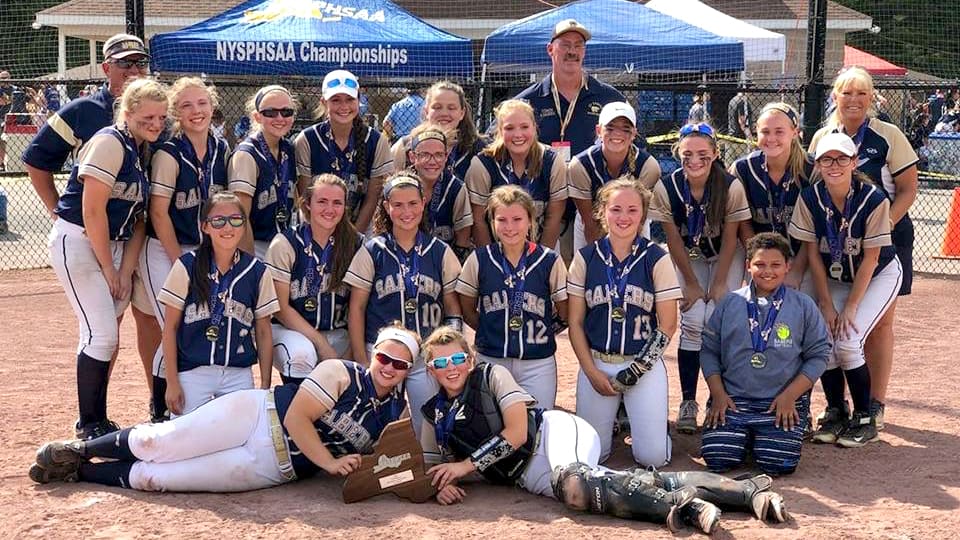
In club ball, we won tied the Triple Crown 18U East Coast Nationals in Myrtle Beach in 2015 with rain preventing a final game. And I’ll never forget in 2013, coming back from an 0-3 Saturday to win five games back-to-back with one pitcher on Sunday, to win the Tournament Championship.
But, it’s not the wins that make the memories. It’s the opportunity to coach some absolutely awesome young ladies who are not just dedicated and talented, but truly amazing people.
What was your biggest coaching disaster?
In our first year coaching a club team, we didn’t take into account the importance of team bonding and team play. We chose very talented individuals for the team, but they were just that – individuals. A team with that much talent should have been winning game after game, but we couldn’t get out of our own way. We had cliques and “mean girls” and sadly, some of the parents were just as bad as the girls.
The experience was so unpleasant that it was almost our first and last year of coaching travel ball. Fortunately, we sat down with a seasoned travel coach who gave us some great advice. We reassessed how we chose players (and parents!) the following year and it made a tremendous difference. Here we are, 16 years later, still loving it!
What is your coaching philosophy?
When our athletes leave, we want them to say their time with us was a positive, rewarding experience. We want them to not only grow and develop their skills as an athlete, but also as responsible, caring citizens and leaders. We want them to learn. To laugh. To love.
Our hope is that our athletes feel a love of the sport, as well as to feel our care and love for them as players and individuals.
How did you nail your team culture?
We learned long ago that team culture is important, but found it difficult to implement some of the things we do with our club team into our high school team. After tryouts, our club team has almost nine months together before we start playing tournaments, as opposed to high school where we have just a couple weeks to teach and practice together before three to five games a week are shoved into a three-month season.
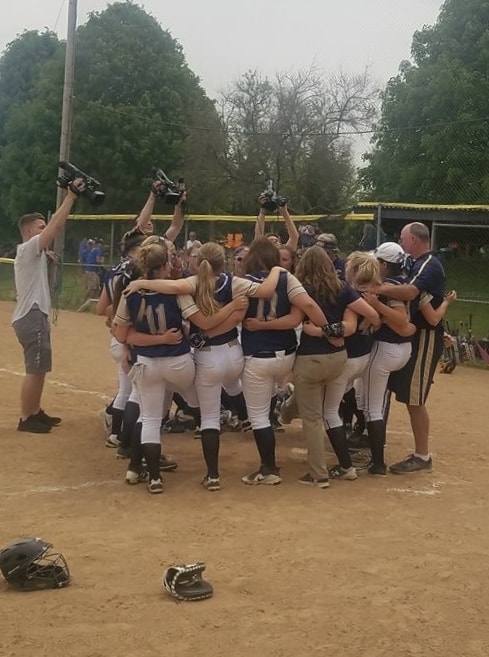
The most significant change in our coaching culture came after listening to University of Michigan’s head coach, Carol Hutchins, a few years ago at Be the Best. Her speech on culture was so tremendous that it motivated me to take a hard look at our teams (particularly our high school team) and make significant changes to our routines and rituals.
We incorporated many of Coach Hutchins’ ideas, finding that even little things like adding motivational quotes to our calendars and hanging inspirational signs in our locker room and dugout helped reinforce the positive culture we wanted for our team.
We also learned that team bonding was essential to achieve our goals, so we made sure we took the time to prioritize it into our busy schedule. We had previously believed we couldn’t afford to give up precious time for team bonding with our high school team, but after listening to Coach Hutchins, we realized we couldn’t afford not to! We found it didn’t take all that much time and the rewards were invaluable.
How do you know when you’ve made an impact on a player?
The impact we have on players is most evident by the relationships we still have with them long after they’ve moved on. Last week we had dinner with a former player who was in town for the holidays, after which she sent this message:
Little did I know 9 years ago that you two would be the most inspiring people I’d ever meet. Thank you for showing me that hard work, a kind heart, and a LOT of laughs are the most important things in life! Can’t wait for the next time! Love you guys!
That’s how you know you’ve made a difference.
In keeping with the tradition that Be the Best is a convention created for coaches by coaches, we’ve asked for inspirations and stories from your contemporaries. Click here to share something about your coaching journey. Don’t worry about making it sound good — you coach the kids, we‘ll work the words.
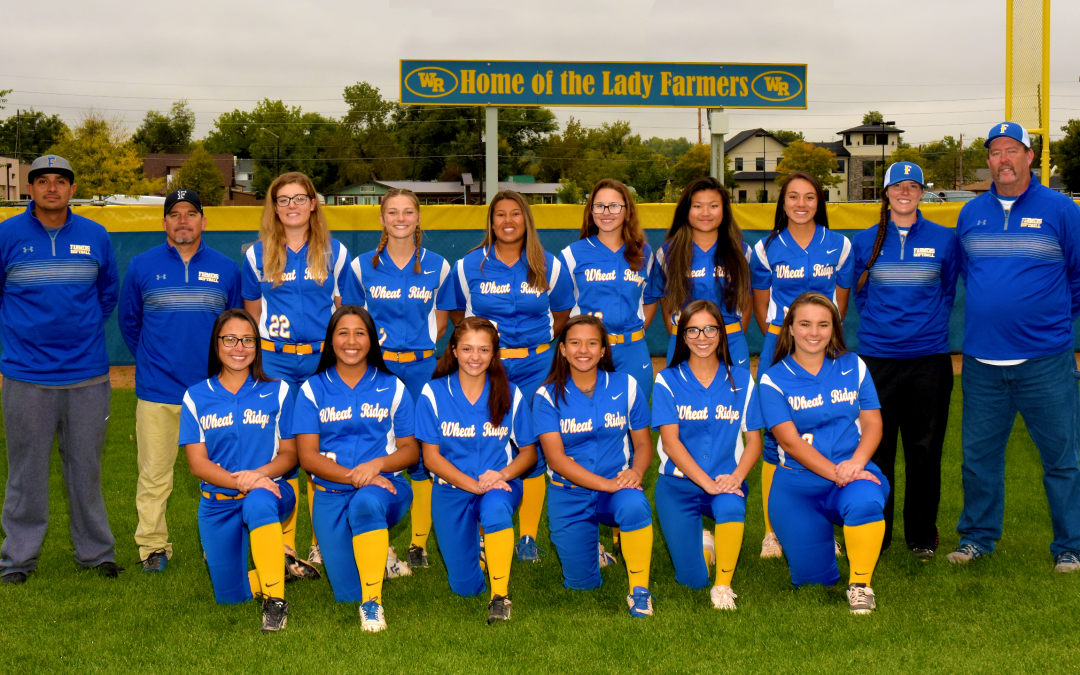
Jan 13, 2019 | Coach Profiles, Softball
James Heflin
Head Softball Coach, Wheat Ridge High School
Wheat Ridge, Colorado
14U and 18U Club Coach
11 years of coaching
What was your best worst moment in softball?
We were in an ASA 18U Gold Qualifier and had made our way to the semifinal game against a national powerhouse – Newtown Rock Gold. It was a real David vs Goliath match-up. But, we went into extra innings and held a three-run lead with Rock holding bats in the bottom of the inning. There was such electricity surrounding the game that other teams gathered around the field, many rooting for us to take down the Rock. So, there were a couple hundred people invested in this game, and probably the biggest atmosphere my third baseman had ever played in.
This third baseman had been lights-out all year, but proceeded to make three errors in a row, which set the table for a dinger later in the inning. These were routine lazy grounders but the hype and pressure of “The Moment” had clearly gotten to her.
Well, we lost the game.
Afterwards, I put my arm around her and said that we as a team had played the best we’d ever played and should be proud that we were able to hang with a club of that caliber. I said that yes, a win would have been great but better than a win was what she would take from the game into her future.
I was right. She not only grew as a player, but took her game to the next level and is enjoying a great career playing softball in college.
Have you had any memorable coaching disasters?
It was all over a call. A very clear call. Or at least I thought it was clear!
There we were in the quarterfinals of the 4A Colorado state playoffs against Air Academy. Their three-hole hitter, and a real stud, was up at the plate. I call a timeout. In the huddle, I stated that we were going to pitch to her, (this was 2016 so intentional walks still had to be pitched) but hoped that she’d chase three balls off the plate. Basically we’d throw outside and give her nothing to hit and then take our chances with bases loaded when the four-hole, who had only one hit on the day, came to bat.
So, I get back to the dugout and my pitching coach affirms what I had said: three balls off the plate. I say yes. She reiterates the call through signals to the catcher.
All good.
A couple seconds later, the ball was pitched and at contact you immediately know that 1) the ball was pitched inside and 2) it was going to leave the park as quickly as it was pitched.
Again, it was “The Moment.”
Aurora Sports Park is a great softball venue that can draw thousands of fans, which certainly has an effect on the players. My catcher, after receiving the game plan in the huddle, after getting the signal from the pitching coach, still gave the pitcher the inside pitch signal.
We ended up losing 7-5.
The catcher defended herself saying that I had called an inside pitch. The pitcher knew it was the wrong call but was afraid to call a timeout thinking that we had used all our conferences. If we had, and she called a timeout, then the rules state we’d have to take her out of the game.
So what did I learn from that?
First of all, though I know I was clear as day going over the game plan in that huddle, I realized that in the heat of the battle, in “The Moment,” it’s easy to mess up. I know I have to double and triple check to make sure that everyone is on the same page. And secondly, I make sure to let the team know they have a field timeout if they need it. I now have a card drawn up for that very moment and in practice, we discuss and teach “The Moment.” OFTEN.
When have you had a significant impact on a player?
Besides the aforementioned third baseman, Izzy, a player on my Varsity Wheat Ridge High School team comes to mind. She has started since she was a freshman, has three years of regional and state tournament experience and is a great leader on the field and in the locker room.
However, our 2017 season had a lot to do with that.
Our team two years ago was not very talented. We had a lot of seniors who were in the starting line-up but prior to that season had really just been role players in the program. Many of them were not competitive travel ball players and did not have the Wheat Ridge mindset, which was that of a championship team.
We barely made it to the state tournament that year and struggled all season on the field and with a lot of locker room turmoil.
Izzy and I had a conversation in which we talked about how the team itself controls the players’ identity and that they alone will determine our success. We discussed our team philosophy that was presented pre-season and how the choices one makes every day is a huge part of leadership.
We had a real lack of leadership on that team We had many small cogs of cliques, the bus was not cohesive, our competitive spirit was weak and many individuals were way more concerned about themselves and their senior year than the welfare of the team.
Going into the 2018 season, Izzy, as a rising junior, asked to speak with the coaching staff during summer workouts. She proposed that while she thought it was great how we derive a new philosophy every season to reflect each year’s team make-up, it might make sense to break the philosophy down into three parts to review and discuss as the team evolves.
This is where you realize all the experience in the world as a coach doesn’t trump a player’s input. You have to hear your players.
This past season we broke down our working philosophy into three parts. The team’s identity dictated how mid-season and post-season philosophies were orchestrated and it worked out well. The locker room lost its drama and our on-field team and coaching staff came together as a whole. Though we lost in the first round of the state playoffs in a slug fest, the kids will be coming back stronger – both mentally and physically – to make a run at a title for the 2019 season!
So what is your three-part philosophy?
Pre-season philosophy: We believe that the previous season dictates the basis of the philosophy. We look at what we did well. We look at our inconsistencies. We look at our mental game. And we preach identity, communication and TEAM.
Mid-season philosophy: We look at what we are doing well and where we need to improve. We review our mental game and again, our inconsistencies and their domino effect on the team.
Post-season philosophy: We summarize the season. How did we get here? What is our current identity? What have we done well? Everything has a POSITIVE spin to carry over to the next season.
What coaches have you learned from over the years?
Karen and Ralph Weekly! They put on a clinic at my club team’s indoor facility back in 2011 and I gained so much from their interaction. After the clinic, they stayed and we discussed the game. They were probably the biggest influence in how I run my defensive strategy as well as my short game and slapping strategy.
Coach Tommy Mann was my CYO football coach back in Springfield, Ohio at St. Teresa’s. This coach won games before the game even started with his precise and sharp warm-up. This laid my foundation and instilled in me the importance of everyday warm-ups and how to intimidate by warm-up on game day.
And last, but not least, Nick Saban. He has been a huge influence on me, not because he has won a multitude of championships, but because of how he communicates his philosophy to his program. He projects the best relatable teaching of leadership and choices I’ve ever heard.
It seems like a coach’s dream to take over a winning program. Is it?
I have taken over a few programs in my coaching career, but none as difficult as Wheat Ridge High School. The program won six state titles in the 2000’s with 20 straight appearances and in the Colorado State Tournament. The previous coach had won titles in 2008, 2009, 2011, 2013 and was a runner up in 2015.
I took over the program in 2016.
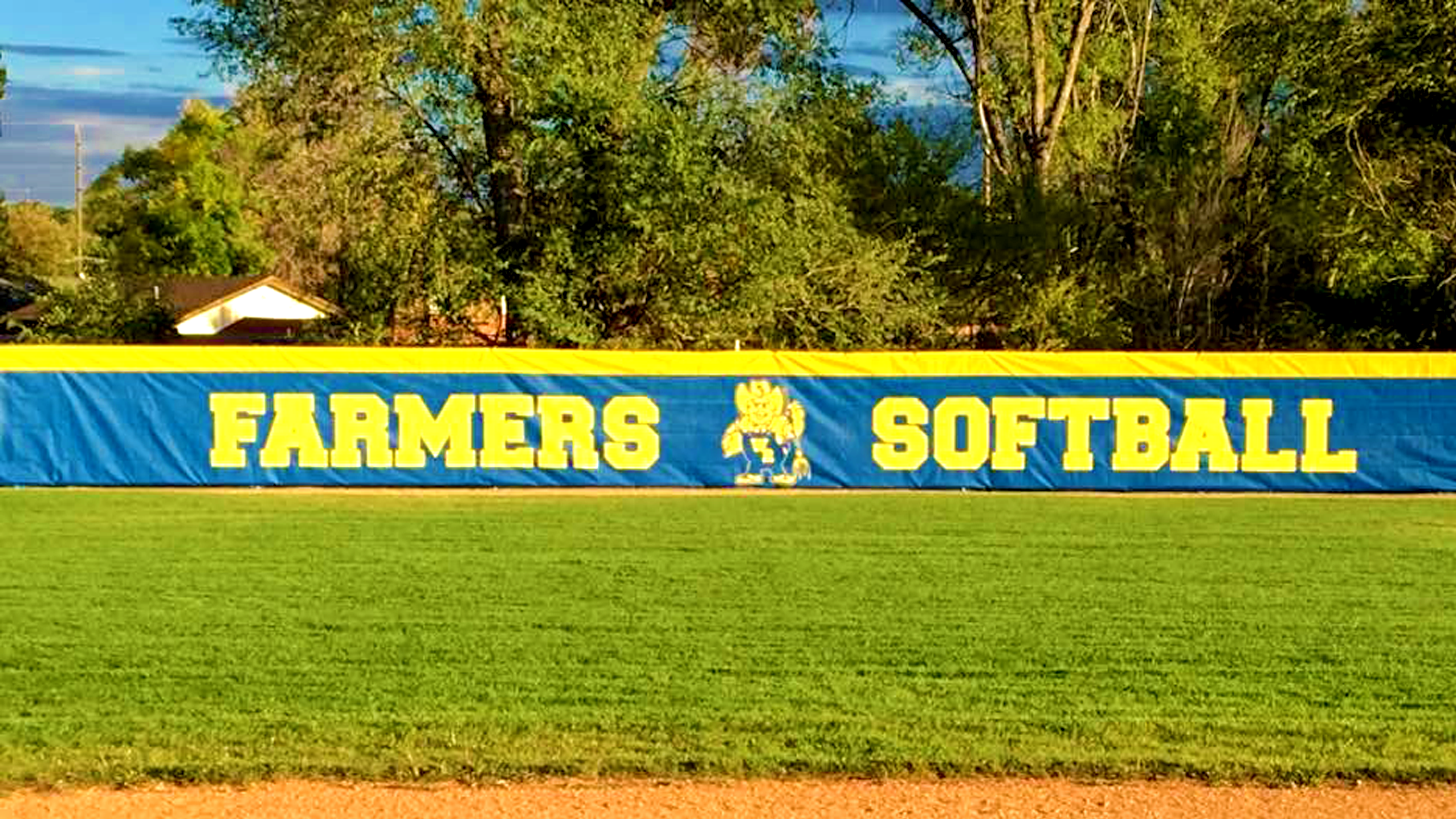
A program’s inner philosophy, mentality and game strategy is very difficult to change in the first couple of years. Although very successful, the Wheat Ridge mentality that I inherited was that of an old school football coach. When you’re winning state championships, a lot of things can be overlooked. However, as a new coach, your first couple of years are a test. Not only from players, but the program community in general. Including parents.
Although we made it to the state tournament in both 2016 and 2017, I can’t say it was particularly enjoyable for me or my staff. This past 2018 season was the first year we felt like we were making an imprint of our own on the program.
So, is taking over a winning tradition easy? No.
It takes a few years for a coach to make a dent in a program with his or her coaching style, fundamentals, strategy and philosophy. Despite making it to the state tournament my first two years, it took until the 2018 season for me to feel successful and confident that my program was in place.
As we enter the 2019 season, I can finally say it’s completely our program and I couldn’t be more excited to see what’s in store for my players and staff.
In keeping with the tradition that Be the Best is a convention created for coaches by coaches, we’ve asked for inspirations and stories from your contemporaries. Click here to share something about your coaching journey. Don’t worry about making it sound good — you coach the kids, we‘ll work the words.

Jan 7, 2019 | Baseball, Softball
One of the many highlights of Be the Best is the after-hours Coaches’ Party on Friday night. This informal gathering is where attendees and speakers mix and mingle, sharing stories and drinking beers.
After a day filled with awesome information, it’s the perfect place to talk about what you’ve learned with those who know the game the best. And, after a few brews, there’s nothing better than boasting about your top players. Your championship team. Or even that walk-off you slammed over your high school fence back in 19…
Don’t miss the Coaches’ Party on Friday night. You don’t have to leave the hotel. The party comes to you. Exact time and location will be announced during the day.
Can’t wait to see you all, party with you all and learn with you all!
Registration is still open!
Baseball Coaches’ Convention
Thursday, January 10 – Saturday, January 12
Make your hotel reservations NOW!
Softball Coaches’ Convention
Thursday, January 17 – Saturday, January 19
Make your hotel reservations NOW!
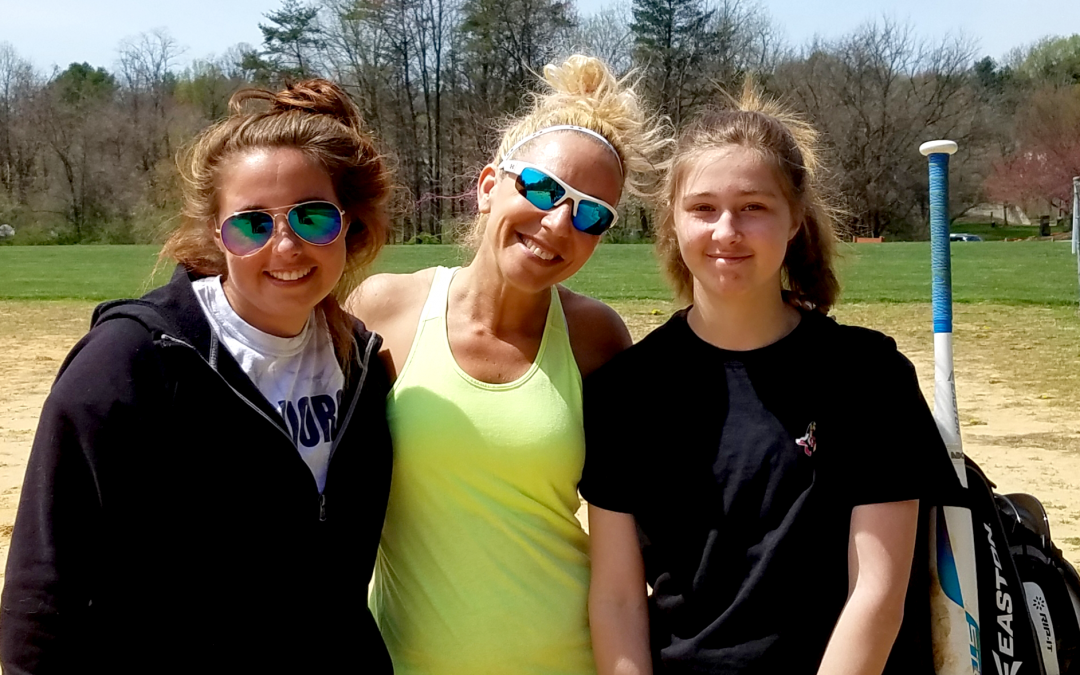
Jan 4, 2019 | Coach Profiles, Softball
Laura Horstkamp
Independent Trainer,
Softball
Sometimes the best way forward is backwards.
Laura Horstkamp started her coaching career at the college level. From there, she moved on to high school. Then to travel ball. And now, it’s private lessons and guest instruction. Which, self-admittedly, is all kinda backwards.
Laura, who started playing softball when she was ten years old, lucked into coaching. She wasn’t looking for a job. She was simply playing in a slowpitch game against the head coach of a local D3 college. That coach liked what she saw and asked Laura to join her staff. The next 13 years wrote themselves.
A good coach, Laura believes, goes above and beyond the basic teaching of skills. You have to be able to lead, inspire and develop your athletes. You have to cultivate a culture of strong women by fostering an environment of constant learning and trust. And, it’s your responsibility as a coach to make sure your players have the right mindset, constantly striving to improve and progress. Because progress, no matter how small, is still progress.
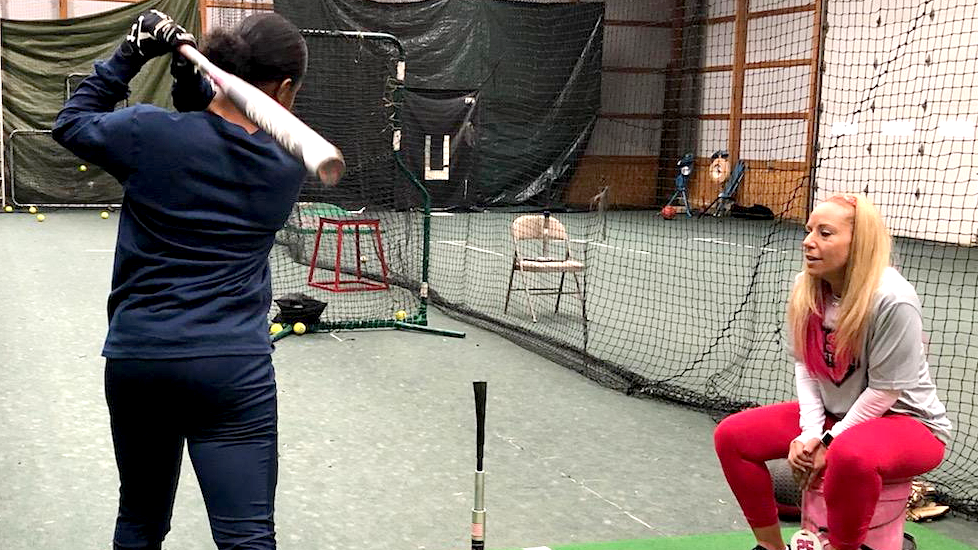
Laura loves coaching. She loves teaching. She loves inspiring. And she loves seeing the results. Sure, she’s had her share of somewhat unmemorable moments. Like the game in which her team gave up something like 20 runs.
But, her truest victories and greatest gifts come from seeing first-hand the impact she’s had on the players she has coached. One of her former students is now giving lessons herself and continually acknowledges the influence Laura has had on her coaching career. She has learned from Laura how to customize training and practice drills to each individual’s style of learning and the importance of meeting kids where they are.
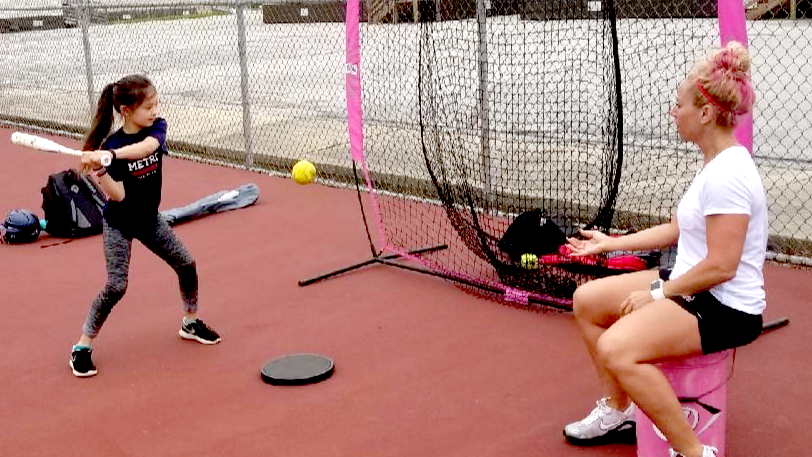
And that makes the coach in Laura proud.
Laura Horstkamp has no children of her own. But hundreds have benefitted from knowing her, both as a coach and a person. When you get a Snapchat on Mother’s Day, from someone who’s not your kid saying how much you mean to them, you know you’ve made it.
Even if you kinda did it backwards.
In keeping with the tradition that Be the Best is a convention created for coaches by coaches, we’ve asked for inspirations and stories from your contemporaries. Click here to share something about your coaching journey. Don’t worry about making it sound good — you coach the kids, we‘ll work the words.














